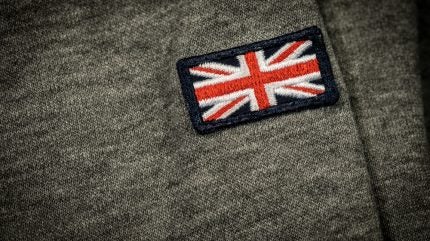UK apparel suppliers use sustainability to overcome Brexit

UK APPAREL SUPPLIERS USE SUSTAINABILITY TO OVERCOME BREXIT
Amid rising
inflation and the ongoing impact of Brexit, UK suppliers tell Just Style how
fashion manufacturing in the country is changing.
At the recent Source
Fashion trade show in London UK suppliers shared how they are using their
sustainable credentials to increase the appeal of ‘made in the UK’.
Made and sourced in the UK
TS Knitwear, a family-run knitwear business
based in Leicester is using wool sourced in the UK in its designs. The company
also offers a high-tech knitting plant, and what it describes as the latest in
seamless garment technology.
TS Knitwear highlights that as well as signifying quality, homegrown yarns shorten the garment supply chain, which increases its sustainable credentials.
TS Knitwear director Charanjit Biring tells Just Style sustainable fashion is “where the future lies,” but without long-term commitment from brands it can be difficult to invest in.
The company offers garments constructed in single, individual pieces with each piece of the garment knitted together at the seams. This reduces waste – lowering costs and its environmental impact.
TS Knitwear has previously supplied apparel brands such as New Look, Disney and TK Maxx. While it has previously exported products to Germany and France, most of its business is now within the UK – something the company believes is an increasing trend since Brexit.
Biring says the company has recently seen an
increased number of orders from the US. However, he also criticised the lack of
support from the UK government since Brexit. “There’s no more funding,” he
states.
Make UK, an organisation representing
manufacturers, released data last month showing that while manufacturers
contributed £217bn ($284.99bn) to the UK economy in 2023, the country moved
from being the eighth to the 12th largest
manufacturing country in the world.
According to research from Tradebyte and
Retail Economics, UK clothing exports to the EU have fallen by 60% since
Brexit, as suppliers struggle to deal with red tape.
Faster turnarounds for local brands
FIGASTORE, another Leicester-based supplier
of womenswear and childrenswear, focuses on its ability to offer quicker
turnarounds compared to its competitors based further afield. The manufacturer
offers a full design service from research through to design development.
As well as its Leicester base, FIGASTORE
also has manufacturing sites in Morocco and Pakistan. The company explains its
biggest customers include ASOS and Boohoo-owned PrettyLittleThing (PLT) – two UK-headquartered fashion
retailers.
Designer Brittany Goodwin shares the
increasing speed of fashion trends, particularly those created on TikTok and
other social platforms, has increased the need for quick turnarounds between
design and manufacture.
She says the company’s offer combines
competitive pricing alongside better quality thanks to its UK-base.
Goodwin adds being based in the UK puts the
firm in a great position to respond quicker than other suppliers outside the
country. The company says sustainability is an increasing concern and it is
trying to improve here, but admits that brands “can’t have it all” when it
comes to turnaround times, prices and green claims.
Sustainable British labels for
apparel
National Weaving, a family-owned label
business based in Wales, has found success in supplying its sustainable range
of labels, made using 80% recycled yarn. The company’s factories are equipped
with solar panels, which provided 42% of its energy needs in 2023.
The company is also working with the
Salvation Army Trading Company on a polyester recycling system.
The company also boasts quick turnaround
times – something it has found essential, with many fashion brands leaving
labels to the last minute.
“A lot of people are always in a rush – so
that’s where we can fit quite nicely,” Tom Christopher, sales manager at
National Weaving, tells Just Style.
National Weaving offers a standard
turnaround of three-to-five days, although it has sometimes been able to
complete projects in just 24 hours. The company says it is well-equipped to
serve both start-ups and established brands alike.
Since the pandemic it has found new local
customers who previously ordered labels abroad but needed to find alternatives
due to shipping delays.
With most of its customers based in the UK,
National Weaving has not struggled with post-Brexit customs delays, although it
says it has found it difficult when dealing with extra paperwork for its
overseas customers.
However, the business still faces increased
competition from Chinese businesses, which tend to offer lower labels at lower
prices. It hopes its offer of quick turnarounds, combined with its
sustainability credentials and local appeal help it to stand out going forward.
“We are a sustainable small business. We’re
living wage employers and it’s all made in Britain,” Christopher adds.
By Just Style
